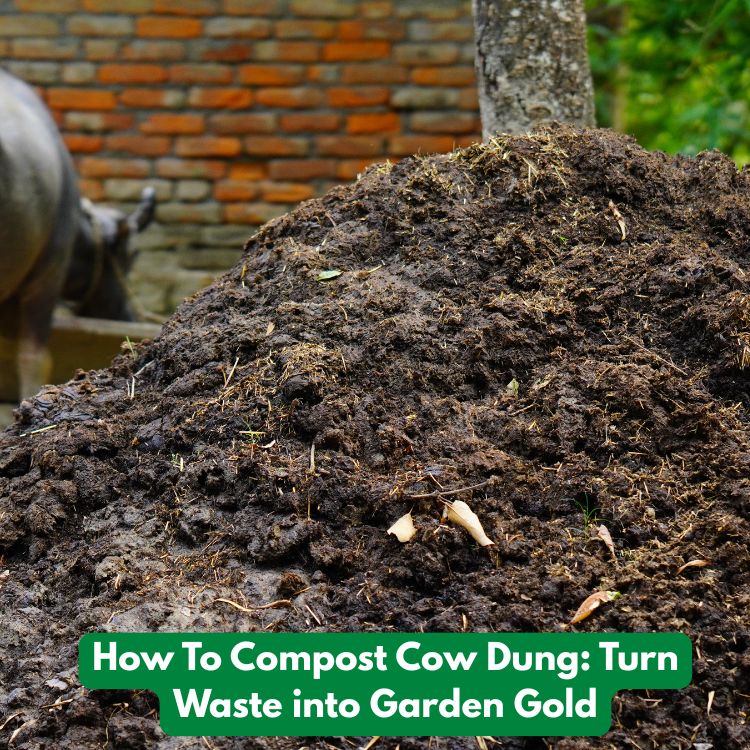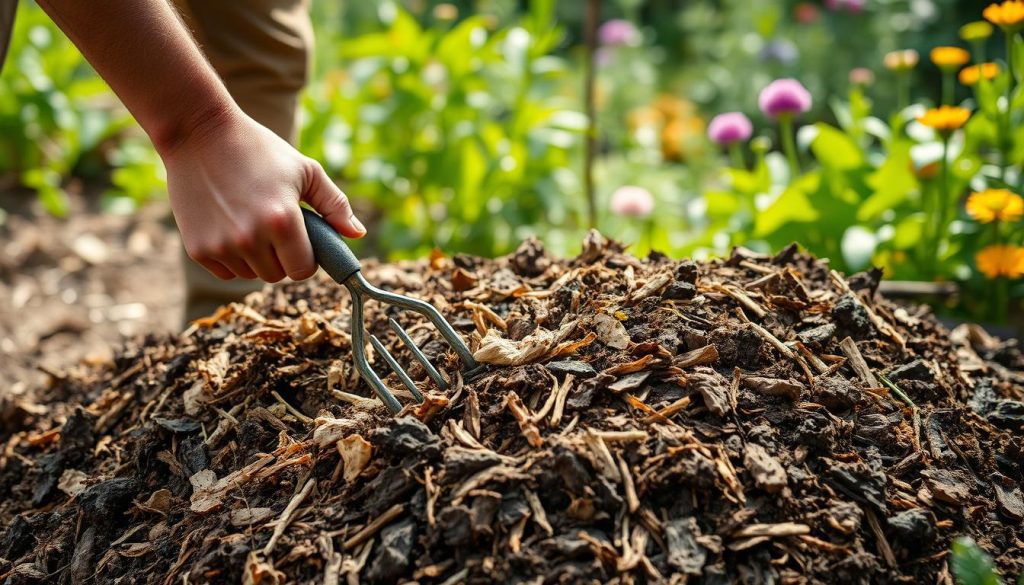Cow manure: it’s not just waste, it’s a goldmine for your garden!
Using cow dung as compost is an eco-friendly way to recycle what would otherwise be… well, you know.
Plus, it’s packed with nutrients that’ll make your plants thrive.
Want to learn how to turn that “waste” into something amazing?
In this blog post, we’ll break down the steps from TensionFreeWorld’s YouTube video, “How to make compost from cow dung | How to decompose cow dung,” to help you create your own nutrient-rich fertilizer.
You can also watch the full instructions in their video below
Why Cow Dung Compost?
So, why should you even bother with composting cow dung? Let’s look at the awesome benefits for your garden and the environment.
Benefits for Your Garden
Think of cow dung compost as a super-powered soil booster. It does wonders:
- Improves soil structure: Cow dung helps break up heavy clay soils and binds sandy soils. This means better aeration and water retention for your plants.
- Rich in nutrients: Cow dung is full of the good stuff plants need, like:
- Nitrogen: For healthy leaf growth.
- Phosphorus: For strong roots and beautiful blooms.
- Potassium: For overall plant health and disease resistance.
- Beneficial microbes: It introduces helpful microorganisms to the soil. These microbes help break down organic matter and make nutrients more available to your plants.

Environmental Advantages
Composting cow dung isn’t just good for your garden, it’s great for the planet too!
- Reduces waste: It’s a sustainable way to manage agricultural waste. Instead of just piling it up, you’re turning it into something useful.
- Reduces reliance on chemical fertilizers: Natural fertilizers are better for the environment.
- Lowers greenhouse gas emissions: Manure left to decompose naturally releases harmful greenhouse gasses. Composting helps reduce these emissions.
Step-by-Step Guide: How To Compost Cow Dung
Ready to get your hands dirty? Here’s how to make cow dung compost, step by step.
Materials You’ll Need
First, gather your supplies:
- Fresh cow dung
- Dry leaves or straw
- Water
- Optional: Compost starter (to speed up the process)
- Shovel or pitchfork
- Compost bin or designated area
Creating the Compost Pile
Now for the fun part!
- Location Selection:
- Choose a shady and well-drained spot for your compost pile.
- Shade is important because it helps keep the pile from drying out too quickly.
- Layering the Materials:
- Start with a layer of dry leaves or straw at the bottom.
- This layer provides aeration, which is essential for the composting process.
- Add a layer of fresh cow dung on top of the dry material.
- Alternate layers of dry material and cow dung, like lasagna!
- The ideal ratio is about 2:1 or 3:1 of dry material to cow dung.
- Moisten each layer with water as you go.
- The pile should be damp, like a wrung-out sponge, not soaking wet.
- Monitoring the Pile:
- Check the moisture level regularly.
- Turn the pile every few weeks.
- This helps with aeration and decomposition. Just use a shovel or pitchfork to mix the layers.
- Monitor the temperature. A hot compost pile means things are working!
- The ideal temperature range is around 130-160°F.
- If the pile is too hot, add more dry material. If it’s too cold, add more cow dung.
- Patience is Key:
- The time it takes for cow dung to decompose depends. Moisture, temperature, and turning frequency all play a role.
- Under ideal conditions, you can have compost in two to three months. But it can take six months or more if conditions aren’t perfect.

Troubleshooting Common Issues
Having trouble with your compost pile? Here are some common issues and how to fix them:
- Smelly Compost:
- Cause: Lack of oxygen (anaerobic conditions).
- Solution: Turn the pile more frequently to improve aeration.
- Dry Compost:
- Cause: Not enough moisture.
- Solution: Add water to the pile until it’s damp.
- Slow Decomposition:
- Cause: Lack of nitrogen or carbon.
- Solution: Add more cow dung (nitrogen source) or dry leaves/straw (carbon source).
- Pests:
- Cause: Food scraps in the compost (if applicable).
- Solution: Avoid adding food scraps to cow dung compost. If you have to, cover the pile with a layer of soil.

Making Cow Dung Tea Fertilizer
Want another way to use cow dung for your plants? Try making cow dung tea fertilizer!
What is Cow Dung Tea?
Cow dung tea is a liquid fertilizer made by steeping composted cow dung in water.
Benefits of Cow Dung Tea
Why use cow dung tea?
- Easy to apply: Just spray it on your plants.
- Fast-acting: Plants absorb the nutrients quickly.
- Improves plant health: Provides essential nutrients and beneficial microbes.
How to Make Cow Dung Tea
Here’s what you need:
- Ingredients:
- Composted cow dung
- Water
- A bucket or container
- A cloth or mesh bag
- Instructions:
- Fill the cloth or mesh bag with composted cow dung.
- Place the bag in a bucket or container filled with water.
- Let it steep for 1-3 days, stirring occasionally.
- Remove the bag and use the resulting liquid as fertilizer.
- Application:
- Dilute the cow dung tea with water (e.g., 1 part tea to 10 parts water).
- Spray the diluted tea onto the leaves and soil of your plants.
- Apply every 1-2 weeks.
Tips for Success
Want to make sure your cow dung compost and tea are top-notch? Keep these tips in mind:
- Use High-Quality Cow Dung: Fresh cow dung is best, but make sure it’s free from contaminants.
- Maintain Proper Moisture: Keep the compost pile consistently damp but not waterlogged.
- Turn the Pile Regularly: This ensures proper aeration and speeds up decomposition.
- Be Patient: Composting takes time, so don’t get discouraged if it doesn’t happen overnight.
Cow Dung Composting: All the Guts, None of the Smell..some FAQs!
How fresh should cow dung be for composting?
You can use fresh or aged dung, but fresh has more moisture. If it’s soupy, mix in dry leaves, straw, or sawdust to balance it out.
Do I need to mix cow dung with other stuff?
Yes, it’s a good idea. Dung is rich in nitrogen but needs carbon. Add dry leaves, straw, shredded paper, or kitchen scraps.
This mix helps it break down faster and keeps the pile from getting smelly.
How long does cow dung take to become compost?
If you mix and turn the pile every week, you’ll get usable compost in about 3-4 months.
Slow pokes who don’t turn it may wait 6-12 months.
Does cow dung compost smell bad?
Not if you do it right! Too much moisture or not enough mixing causes bad smells.
Keep the pile moist, not soggy, and add dry stuff to avoid a stink.
Can I compost cow dung straight from the barn?
Yes, but remove big bits of bedding or stones. No one wants compost with surprise rocks.
A quick once-over with a pitchfork works wonders.
Can I use composted cow dung on veggie gardens?
Absolutely. Aged, finished cow dung compost is packed with nutrients for veggies.
Just make sure it’s fully broken down and crumbly—no raw bits.
Do I need a special compost bin for cow dung?
No fancy bins needed. A simple pile in a shady spot works fine.
Some folks like open bins or heaps; others prefer enclosed bins to keep pets and wild critters out.
How do I know when the compost is ready?
It looks dark and crumbly, smells earthy (not like manure or rotten eggs), and you can’t tell what it used to be.
If you see white fungus threads, that’s a good sign—your pile is healthy.

Can cow dung compost attract pests?
If you keep the pile balanced and turned, pests won’t stick around.
Cover food scraps, skip meat and dairy, and keep the pile damp (not dripping wet).
Is it safe to compost cow dung with plant diseases?
Skip dung from cows fed on diseased or sprayed plants.
High heat in the compost pile can kill most bad guys, but why risk it?
How often should I turn the compost pile?
Turn it once a week if you can. If you forget for a bit, that’s fine—just know it’ll take longer.
Can composted cow dung burn plants?
Not if it’s finished. Fresh dung is too strong and may burn tender roots. Finished compost is safe and gentle. No nasty surprises.
What if my cow dung compost never gets hot?
Add more green stuff (like grass clippings) or insulate the pile with straw. Don’t let it dry out, but don’t flood it either.
Tiny compost creatures work best in a cozy, Goldilocks pile—not too hot, not too cold.
Does cow dung compost spread weeds?
If the cows eat weedy hay, seeds might sneak through. A hot, well-tended pile kills off most seeds.
If you don’t want weed drama, check the heat—aim for 130–150°F (55–65°C).
How much cow dung do I need to start?
You need enough to make a heap at least three feet wide and high. Smaller piles won’t heat up well, and your compost party might fizzle.
Can I compost cow dung indoors?
Not recommended. Even well-behaved dung smells, and nobody wants flies at brunch. Stick to outdoor bins or piles.
Conclusion
So, are you ready to turn cow dung into garden gold?
Composting cow dung and making cow dung tea are fantastic ways to improve your garden’s health and help the environment.
Give it a try!
Don’t forget to like and share TensionFreeWorld’s video and subscribe to their channel @TensionFreeWorld for more great gardening tips!






